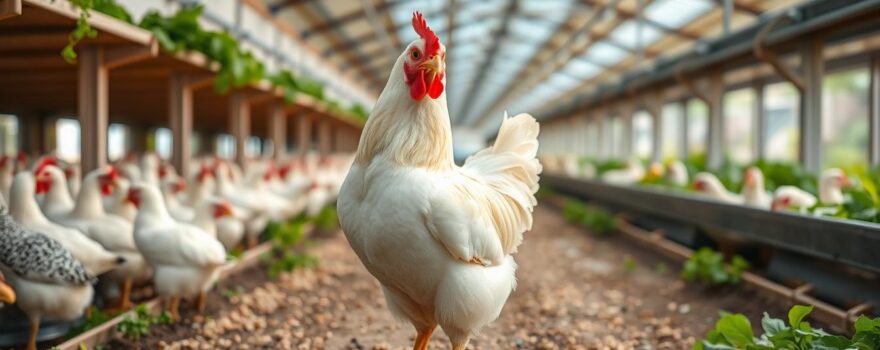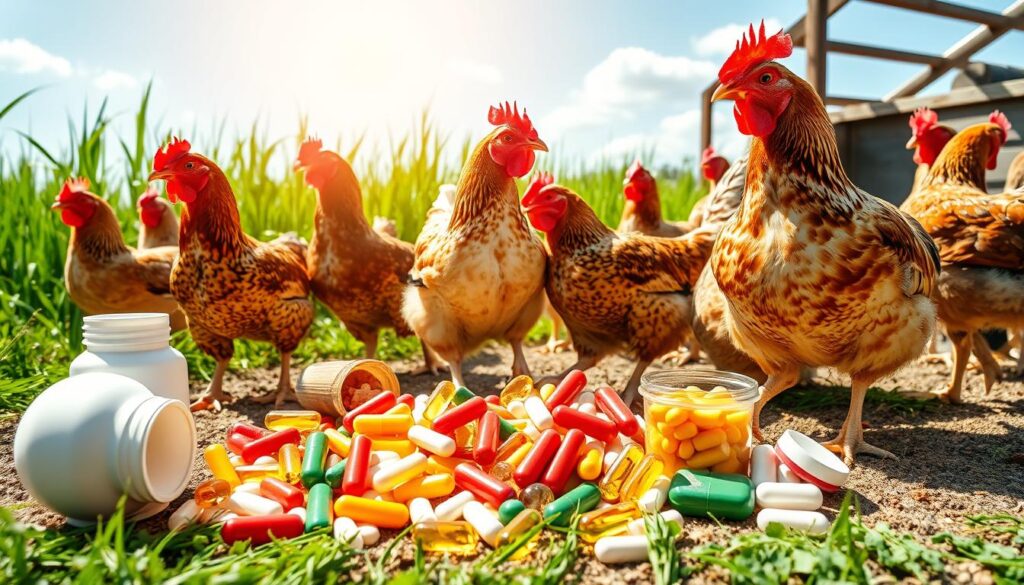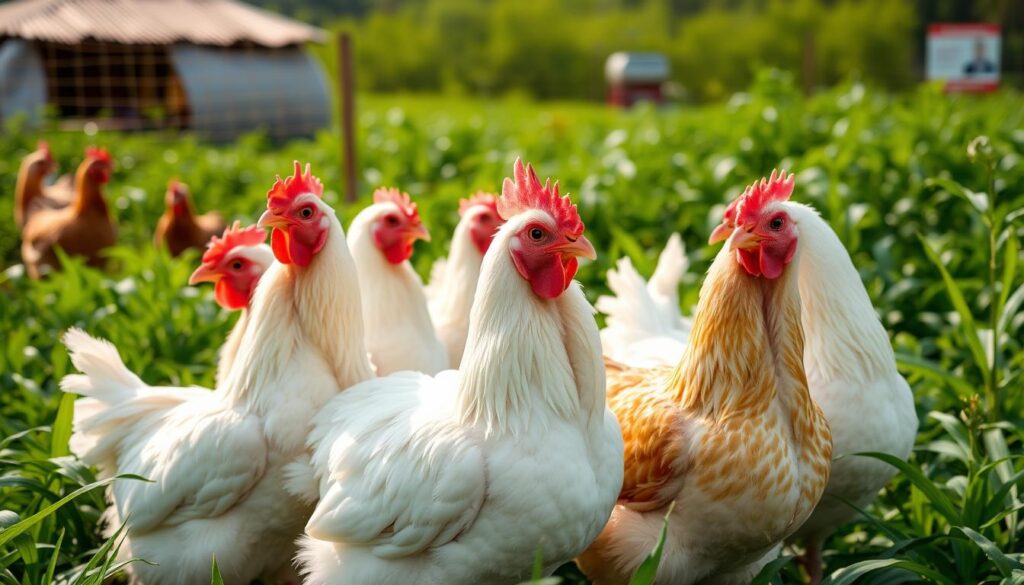
The poultry industry deals with many environmental stressors. These stressors, like heat and cold, affect broiler chickens’ health and performance. They can lead to immune system problems, hormonal issues, and breathing difficulties.
Broiler chickens grow slower, have weaker intestines, and die more often because of these stressors. It’s important to understand and tackle these issues to keep broiler flocks healthy and productive.
By reducing the effects of these stressors, poultry farmers can improve chicken welfare and efficiency. This helps the poultry industry stay strong and sustainable.
Key Takeaways
- Environmental stressors like heat and cold can harm broiler chickens’ health and performance.
- These stressors can cause many problems, including weakened immune systems and lower quality meat and eggs.
- Adding vitamins to chickens’ diets can help them cope with stress.
- Heat stress is a big problem for broiler chickens, affecting their food intake, growth, and meat quality.
- Good housing, with the right temperature and air flow, can help reduce heat stress and improve chicken health.
Introduction to Environmental Stressors in Broiler Chicken Production
In the world of poultry, environmental stressors are key to broiler chickens’ health. These stressors include many factors around them. They can cause distress and harm to the birds.
Things like temperature, humidity, air quality, and how crowded the space is matter a lot. Each one can affect how well the chickens do, how they behave, and their overall health.
Definition of Environmental Stressors
Environmental stressors are things in a broiler chicken’s home that can cause stress. This includes extreme temperatures, changes in humidity, bad air, too many birds in a small space, and harmful pollutants. These factors can affect their growth, how well they fight off sickness, and their overall health.
Importance of Managing Environmental Stressors
It’s very important to manage these stressors well. If not, it can hurt the chickens’ health and how well they grow. It can also make them more likely to get sick.
So, taking care of these stressors is a big part of keeping broiler chickens healthy and productive. It’s essential for good poultry production and the well-being of broiler chickens.
“Proper management of environmental factors is critical for maintaining the health and productivity of broiler chickens.”
Heat Stress: A Major Environmental Stressor
Heat stress (HS) is a big problem for broiler chickens. It happens when a chicken’s body heat is too much for it to handle. This makes it hard for the chicken to keep its body temperature stable.
This issue can cause many problems. It can mess with the chicken’s immune system, hormones, breathing, and balance of salts and water.
Physiological Effects of Heat Stress
Heat stress affects broiler chickens in many ways. It can make them eat less, grow slower, and even die. It also changes how they behave, like drinking more and resting more.
Impact on Growth Performance and Mortality
Heat stress is bad for broiler chickens’ health and how well they grow. It can make their meat smaller and less good. This is a big problem for farmers.
Heat stress also makes chickens’ hearts work harder and their breathing faster. It can weaken their immune system and make them feel sad or depressed.
“High environmental temperatures are a significant stressor in poultry production, leading to substantial economic losses in the industry.”
We need to find ways to protect broiler chickens from heat stress. This is important for their health, happiness, and how well they grow.
The Impact of Environmental Stressors on Broiler Chicken Health
Environmental stressors like heat, cold, feed restriction, and high stocking density harm broiler chickens. These stressors cause many health problems, including weakened immune systems and respiratory issues. They also lead to poor growth, weakened intestines, and higher death rates.
A study looked at how different environments affect fast-growing and slow-growing broiler chickens. It found that birds in complex environments were less stressed. Slow-growing chickens were less anxious and had lower death rates than fast-growing ones. This shows the importance of understanding how stress affects chicken health.
Stress triggers the HPA axis, releasing glucocorticoids. This is a sign of acute stress. IgA levels can also show chronic stress in animals. Complex environments and high stocking density harm chicken welfare and health.
| Environmental Stressor | Physiological Effects | Impact on Broiler Health |
|---|---|---|
| Heat Stress | Increased body temperature, respiratory distress, electrolyte imbalances | Reduced growth performance, weakened immune system, increased mortality |
| Cold Stress | Decreased body temperature, shivering, metabolic changes | Decreased feed intake, impaired growth, susceptibility to disease |
| Feed Restriction | Malnutrition, metabolic changes, hormonal imbalances | Stunted growth, compromised immune function, increased susceptibility to infections |
| High Stocking Density | Increased aggression, feather pecking, contact dermatitis | Reduced welfare, increased lameness, higher mortality rates |
It’s key to understand how stress affects broiler chicken health. This knowledge helps in finding ways to improve their health and the poultry industry’s success.
Factors Contributing to Heat Stress
Broiler chickens grow fast and are very productive. But, they are very sensitive to heat stress. This stress comes from the environment and can harm their health and work.
Climatic Factors
High temperatures, humidity, and seasonal changes are big problems for broiler chickens. They do best in a certain temperature range. But, as the world gets warmer, it’s harder for them to stay cool.
Broiler chickens are a big part of the poultry industry. In 2020, the world produced 133 million tons of poultry meat. But, heat stress is making it harder for the industry to keep up.
Management Factors
How we manage broiler chickens also plays a big role in heat stress. Poor housing, bad ventilation, and too many birds in one place make it hard for them to stay cool. For example, heat can make their breasts smaller and their muscles weaker.
It’s important to control the environment and improve how we raise broiler chickens. This way, we can protect their health and make sure they can work well.
Effects of Environmental Stressors on Broiler Immune System
Environmental stressors like heat and cold harm broiler chickens’ immune systems. These stressors start a chain of changes, including the HPA axis activation and stress hormone release. This stress can weaken the immune system, making it harder for chickens to fight off diseases.
Birds get stressed when it’s too hot or cold. Heat stress can make them eat less, grow slower, and have lower meat quality. Fast-growing broilers are especially vulnerable to heat stress.
Heat stress can also weaken the immune system. It lowers the number of immune cells and antibodies in the blood. Cold stress can make birds lose weight and get sick more easily.
The immune system’s weakness due to environmental stressors makes broiler chickens more prone to infections. It’s important to understand how stress affects their immune system. This knowledge helps find ways to keep them healthy.
“The impairment of the immune system due to environmental stressors can make broiler chickens more vulnerable to infections and compromise their overall health and well-being.”
Studies show that early feeding, probiotics, and better nutrition can help. These strategies can reduce the harm of environmental stressors on the broiler immune response and stress response. By focusing on these areas, producers can improve their flocks’ health and strength.
Nutritional Strategies to Alleviate Environmental Stress
Broiler chickens often face tough environmental conditions, like heat stress. This can harm their health and productivity. Luckily, nutrition can help them deal with these challenges. One key way is by adding important vitamins to their diet.
Role of Vitamin Supplementation
Vitamins are vital for keeping broiler chickens healthy and performing well under stress. Vitamins A, D, E, and C are especially important. They help the immune system and aid in adapting to stressful situations, like heat.
Research shows that vitamins are crucial when chickens face environmental stress. A study by Wasti, Sah, and Mishra (2020) found that vitamins can help chickens overcome heat stress. This improves their health and productivity.
Borges et al. (2004) also looked into how chickens handle heat stress. They found that vitamins and electrolytes in the diet can reduce the negative effects of heat. This helps chickens grow and produce better.
By adding specific vitamins to their diet, chicken farmers can help their birds handle stress better. This leads to better health, welfare, and production for the chickens.

“Vitamins have been identified as essential nutrients that can support the normal functioning of the broiler chicken’s immune system and improve their overall performance during periods of environmental stress.”
Housing and Management Practices to Mitigate Environmental Stress
Good housing and management are key to reducing stress in broiler chickens. Keeping the right temperature, air flow, and stocking density is important. These help create a better environment for the chickens and lessen stress effects.
In controlled housing, the right temperature, humidity, and air flow help fight heat stress. Experts say the best temperature for broilers is between 18°C and 24°C. But, temperatures over 32°C can harm their health and performance.
In open houses, fixing ventilation and stocking density issues is vital. The air flow should be 1.8-2 meters per second. Fogging or misting can help in dry environments.
Insulation and curtains can control air flow and protect chickens from hot winds. Handling birds in the early morning or evening helps avoid heat stress.
Using these strategies is important for the health and productivity of broiler flocks. They help reduce the negative effects of environmental stress, like heat stress, on broiler chickens.
“Proper preparation and anticipation of high-temperature periods are crucial in mitigating heat stress.”
Genetic Selection for Heat Tolerance
As global temperatures rise, heat stress in broiler chickens is becoming more common. Genetic selection for better heat tolerance is now key. Scientists have found genes that help chickens handle heat better. By breeding chickens that can handle heat, farmers can make their flocks more resilient.
Genetic selection focuses on traits like better heat control and less stress from heat. This helps chickens grow well even when it’s hot. It’s a big step towards making the poultry industry more sustainable and productive.
Recent studies have given us new insights into heat tolerance in chickens. They looked at chickens from tropical areas and found genes linked to heat adaptation. This knowledge helps farmers breed chickens that can better face climate change and extreme weather.
Using genetic heat tolerance in breeding is a smart move for the poultry industry. It helps farmers deal with the challenges of climate change and food security. This strategy is key to making broiler chickens more resilient and productive.

“Genetic selection for heat tolerance is a vital strategy in ensuring the long-term sustainability of broiler chicken production, particularly in the face of climate change and increasing environmental stressors.”
Environmental Enrichment for Broiler Welfare
Providing environmental enrichment is key to improving broiler chicken welfare. It involves adding stimuli and changing their living space to encourage natural behaviors. This helps reduce stress effects.
Offering broilers chances to forage, perch, and dust bathe supports their health and well-being. Studies show enrichments like straw bales and platforms boost activity and lower health issues. This includes leg disorders and wooden breast syndrome.
But, choosing the right enrichment is important. For example, straw can be good for foraging but must be managed to avoid infections. Finding a balance between natural behaviors and health is essential for the flock’s long-term welfare.
“Environmental enrichment can improve biological functioning in captive animals by providing them with opportunities to engage in species-specific behaviors, which can ultimately contribute to their overall well-being.”
By using smart environmental enrichment, broiler producers can make their birds’ lives more stimulating. This leads to better behavioral responses and stress mitigation. It greatly improves the welfare of their broiler flocks.
Broiler chickens face many environmental stressors. These include heat, cold, feed restriction, and high stocking density. These stressors can harm their health, welfare, and productivity.
They can cause immune system problems, endocrine disorders, and respiratory issues. This leads to poor growth, weakened intestines, and higher death rates.
It’s vital to tackle these environmental challenges for the poultry industry’s future. A mix of proper housing, nutrition, genetics, and enrichment can help. These steps reduce the harm from environmental stressors.
By using these strategies, poultry producers can keep their flocks healthy. This ensures efficient and sustainable poultry production.
Managing environmental stressors is key for broiler chicken health and growth. Innovative solutions and proven practices can help the poultry sector. This way, the industry can face environmental challenges head-on and thrive.